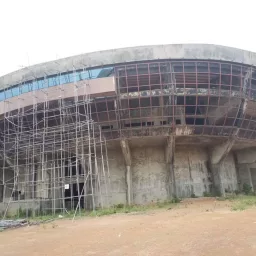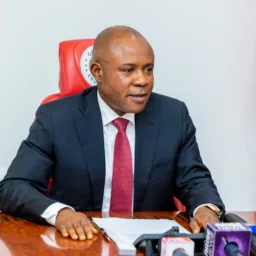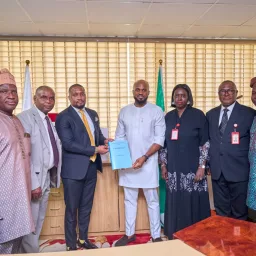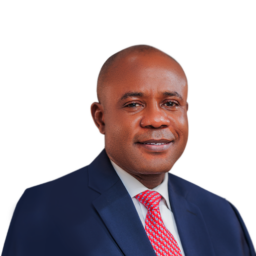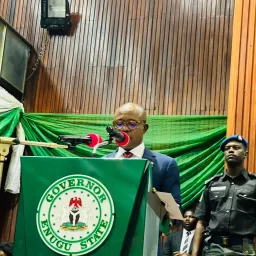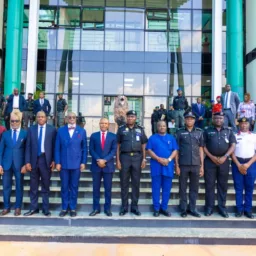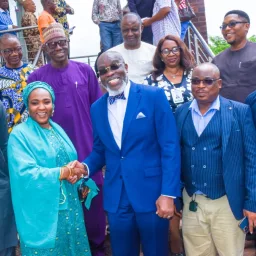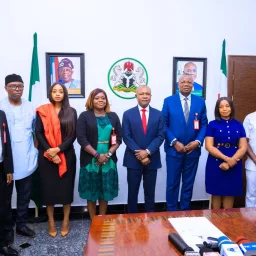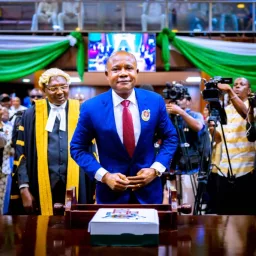
It is with great pleasure that I welcome you all to Enugu for this first Enugu State Investment Roundtable.
You have travelled from far and near to be here. I must thus commend you for the spirit of enterprise and industry that you put into the attendance of this event. As our people welcome and acknowledge those who have put in such noble and remarkable efforts, I say to you, Nnoo.
The theme of this roundtable, “Leveraging Public Private Partnerships” was purposely chosen to align with our administration’s vision of accelerating sustainable economic transformation with the private sector as driver. Therefore, this roundtable marks a new beginning for long-term partnerships and cooperation for shared prosperity. It is expected that it will catalyse the emergence of a sustainable, resilient, and prosperous Enugu.
I speak to you today, both as your host and a member of your community of investors and business owners. A few months ago, like you, I was a player in the business and investment community as the Chief Executive Officer (CEO) of Pinnacle Oil & Gas, a leading player in the downstream oil sector in Nigeria. I thus understand what you need, especially the tone and tenor, indeed the colour, of bureaucratic challenges faced by businesses in Nigeria.
Painting a Picture of Enugu
Enugu state has always played an important role in Nigerian history. Its emergence as one of Nigeria’s tripod of multi-cultural melting-pots (alongside Oyo and Kaduna states) is the stand upon which the then newly independent Nigeria was built.
In the Southeast, Enugu State has historically led its peer states in key socio-economic indicators, as well as serving as the de facto capital of the region. Prior to the civil war, Enugu’s rich coal mines were the engine of the nation’s economy. Beyond the Nigerian nation, Enugu’s coal provided the energy that drove the machines of Europe. Our abundant mineral resources supported a thriving iron and steel industry in Enugu, while our limestone deposits provided raw materials for cement plants. Enugu’s fertile lands have blessed us with rich palm plantations and the best cashew species in Nigeria. Cotton and sorghum grow on our fertile lands, and our Ose Nsukka can be found in almost every Nigerian home.
Aside the above, Enugu also boasts of a wealth of human and natural capital. This, we all know, is the driver for inclusive growth and transition to a green economy. In the realm of tourism, Enugu lends itself naturally to ecotourism as its best sites, as well as a variety of historic and recreational sites, can be found here. Examples include Udi Hills, which provides a bird’s eye view of the total landscape of Enugu, mysterious caves and waterfalls, and potential conservation centres such as the Pine Forest, the 2,500-hectare Milliken Forest reserve and many more.
Enugu’s start-up ecosystem currently ranks fourth in Nigeria and ninth in West Africa, and the state is home to six (6) fully accredited universities. Because of our vast natural gas reserves, Enugu bears the responsibility of playing a critical role in ensuring Nigeria’s green economy transition. Clean steel and concrete, clean cement and fertilisers, trains and buses powered by electricity and cleaner fuels, hydrogen production through clean coal gasification – are all possible in Enugu. Our state has the potential to be a leader in the clean industries of tomorrow.
Enugu State is the heartbeat of Southeast Nigeria and a vital trade and investment gateway into the region. Enugu State is the natural gateway between the South-eastern region, Northern Nigeria, as well as the rest of Africa. This is supported by:
-
- a full-fledged international passenger and cargo airport, one of only six (6) in Nigeria, and the only international airport in the Southeast.
- the strategic Bamenda-Enugu highway corridor, which is currently being expanded, that connects Nigeria to the rest of Africa through Cameroon.
- the Enugu Makurdi expressway which is the primary trade corridor between the North and Southeast region as well as the South–South areas.
- The narrow-gauge railway line connecting Port Harcourt and Maiduguri via Enugu, which is currently being refurbished for increased efficiency.
Enugu State is a market brimming with potential and opportunity thanks to this unique blend of competitive advantages. It also boasts of legacies of achievement, organization and trade.
You thus could not have made a better choice of where to be today other than Enugu State. This is because our state is brimming with a wide array of investment opportunities.
Mission and Vision
I want you all to realize that Enugu has all the characteristics of a socio-economic hub. My administration’s mission is to make Enugu the preferred destination for investment, business, tourism and living in Nigeria. Our core mandate is to restore Enugu’s lost glory, to fully realise the state’s latent potential, and to transform Enugu into an industrial and innovation powerhouse.
Enugu State will become Nigeria/South East’s most remarkable success story driven by industrialization and structural economic transformation, responsible public financial management, robust growth in trade and investment, and sustainable and inclusive infrastructural development.
Our vision is to make Enugu one of the top three revenue-generating states in Nigeria, to attain a 0% poverty headcount rate, and to ensure peace and security in the sprint to grow Enugu to a $30 billion GDP economy in the next 8 years.This vision emphasises inclusive economic growth and sector competitiveness, sustainable economic, social, and environmental resilience for all citizens, and the restoration of peace and security for people, property, and critical economic and social processes.
Economic Transformation Objective
Our Economic Transformation Objective lays the groundwork for decades of sustained growth and transformation in Enugu State. It will accelerate the move towards achieving high standards of living for all residents of the state. Our administration will thus pursue a three-pronged strategy of boosting sector productivity, reforming key state institutions, and creating cross-cutting social sector programmes and services.
Before discussing how my administration plans to implement our integrated sector strategy, I will like to share our deliberate approach towards providing a safe and secure Enugu State. On assumption of office, we prioritized security as a major enabler of development. To this end, our initial drive was to rid our state of the ghost of the illegal Monday sit-at-home exercise. This led to our directive banning that unlawful initiative. We have since improved security across the state and I am currently working with my governor-colleagues in the other South East States to further strengthen the coordination of our security strategies. We shall continue to improve our security architecture in line with our conviction that security is critical for a good investment environment. In line with this, we are in the final stages of setting up the Enugu State Security Trust Fund with the aim of ensuring the sustainability and robustness of our security intervention.
<INTEGRATED SECTOR STRATEGY>
First, this government will shift economic focus away from low productivity activities to focus on activities with heightened productivity. The implementation of the State’s Integrated Sector-Based Productivity Growth Strategy will ensure that sectors with the greatest potentials for growth are supported through measures that will reduce unnecessary regulation, while boosting innovation and growth. It will also expand their capacity to become more competitive through value addition and participation in global value chains. This strategy aims to attract globally competitive industries to Enugu, ensuring that we meet our $30 billion dollar GDP growth target through accelerated competitiveness and industrialization.
The development of the State’s Integrated Sector-Based Productivity Growth Strategy placed squarely into focus those sectors that may hold latent comparative advantage, and the need for a systematic approach and practical steps to scale up Enugu’s industrial base. Agriculture and agro-allied industrialization, energy and mineral resources, transportation and logistics, ICT, the creative industry, tourism and hospitality are among the priority sectors identified in the State’s Integrated Sector-Based Productivity Growth Plan. They will be supported by the expansion of urban and rural infrastructure.
The Integrated Sector-Based Productivity Growth Strategy will prioritize industrialization. This will be a key objective to achieving development and participation in regional value chains, investment facilitation and export promotion. It will also be relevant in financing industrialization, infrastructure development, trade facilitation and logistics.
In agriculture, the state will prioritise the development of special agro-allied industrial zones. The aim is to drive the modernization and productivity of our key agricultural product value chains. It will also drive value addition, increase our export potential, and create rural jobs. Because technological advancements are now essential to achieving agricultural sustainability goals, our focus will be on scaling technologies for agricultural system transformation, such as productivity-enhancing farm machinery, e-wallet systems to track subsidised agricultural inputs, providing soft loans to farmers, and technology-enabled extension services that educate and provide technical assistance to farmers on latest agronomy practises.
In Energy, we will develop our natural gas fields and quicken our investments in clean energy sources like biogas, solar, wind, and hydropower. These will enable us to power important public institutions like universities, colleges, hospitals, health centres and government offices. Recently, we announced the Enugu State Electricity Market policy. The supporting bill has been presented to the State Assembly. The process of setting up our Regulatory Commission will be concluded once the bill is signed into law. The objective is to open our electricity sector for private sector investment and ensure that investors are given the necessary policy and regulatory support to confidently invest in the power sector. This will lead to a competitive energy market that is reliable, promotes our just transition strategy, is cost-effective and meets our current economic growth trajectory.
Enugu’s priority in the mineral sector is to catalyse technical assistance towards ensuring the development of a sustainable exploration, production, and consumption approach. It will ensure that we are able to harness our mineral resources with minimal environmental impact. With this, we will develop mineral resources on our soil using a sustainable value chain approach. This we will do by mobilising financing to conduct a thorough geo-spatial mapping of our natural resource endowments, followed by their sustainable extraction, beneficiation, and value addition.
Implementing the Integrated Sector-Based Productivity Growth Strategy requires a strong focus on where, when, and how much we invest in complementary transport and ICT infrastructure to support priority value chains. To facilitate the inter- and intra-state movement of people and goods, we will develop complementary air, road, and rail infrastructure, as well as resilient multimodal transportation systems. From natural gas to limestone and laterite, Enugu has the resources to build and power resilient transportation infrastructure.
It is impossible to overstate the importance we place on ICT as a key driver of the economic transformation objective of our administration. Our vision is to increase broadband internet availability, establish ICT and tech clusters, build a tier 4 hyperscale commercial AI data centre, implement structured ICT education in primary, secondary, and tertiary institutions, and increase skill acquisition in four areas of interest: fintech and digital finance, IT services, cyber security, and e-commerce.
To expand its thriving creative sector, Enugu will invest in a film and movie academy, as well as an arts and crafts village. Around the tunnels and chambers of our caves and waterfalls, we will partner with the private sector to construct resort areas and modern access and safety infrastructure. Enugu will build secure outdoor areas where kids can play and explore the outdoors, starting with nature parks and theme parks.
We will drive a once-in-a-generation investment in roads, bridges, railroads, ports and other infrastructure. To facilitate the inter and intra state movement of people and goods, we will prioritize efficient and resilient multi-modal transportation systems. We will expand trade infrastructure and facilitation measures. This drive for infrastructure build out is exemplified by our efforts to date in the area of water provision. When I took office, I promised the people of Enugu that water would be made available in all homes in Enugu metropolis within the next 180 days. Just over 90 days after that promise, we are now producing in excess of 25 million litres of water daily for the first time in the last 20 years, and we are poised to produce 70 million litres of water daily by next month. In this light, I would like to reiterate my promise; there shall be water flowing from every tap in Enugu metropolis before the end of November this year.
Beyond measuring GDP growth, our economic transformation objective includes social transformation strategies that can improve the quality of life for all Enugu State residents. We also aim to foster long-term prosperity and resilience for all. Our cross-cutting social sector intervention top priorities include strengthening and expanding essential and supplementary social safety net programmes. It will increase resilience to economic shocks and eradicate extreme poverty. We will work to increase demographic dividends by making sure that everyone has access to high-quality healthcare and education. The expansion of specialised maternal and infant care, strengthening the financial sustainability of tertiary and primary healthcare facilities, and enhancing the capability of healthcare workforce will be prioritized.
As part of our social sector strategy, we will actively modernise our water resource systems. That exercise will guarantee both urban and rural residents access to clean water and sanitation facilities. Our goal is to combat poor health outcomes and malnutrition at the primary school level through school meal plus and immunisation programmes. We will equally provide free and excellent secondary school education, vigorously promote and support vocational and technical education, and champion the welfare of teachers. This chain is crucial to the success of our educational system. This direction is best exemplified by our model schools programme under which we are going to develop 260 model basic schools across the 260 wards in the state. These modern schools will have world classrooms, recreation areas and teachers’ quarters. A pilot of this model school is already under construction and nearing completion. These schools will provide a most auspicious learning environment in line with our ‘cut-off point campaign’ which aims to ensure that no child in Enugu lacks access to world class education in the next 4 years.
Finally, because strengthening institutional capacity is a fundamental precondition for achieving Economic Transformation Objective, our governance philosophy emphasises transparency, traceability, and accountability across key government institutions. We give particular place in this regard to the judiciary, civil service, security, and community leadership institutions. This includes instituting judicial reforms, establishing specialised business and investment courts, as well as unwavering investment in security infrastructure. The latter will provide restoration and maintenance of peace and security for people and property, as well as critical economic and social processes. We will improve the administration of justice system and the rule of law, enhance the capacity, accountability, and service delivery of public institutions, and increase citizens’ participation and engagement through platforms. The ultimate aim is to facilitate focused dialogue on developmental issues.
Business Environment and Public Private Partnership
The State government is fully aware of the significant difficulty in transforming any institution to one that is resilient and sustainable. Our goals for economic transformation are challenging but attainable, and our government is resolute in its commitment to deliver on the promises we made to Ndi Enugu.
Realising this goal will necessitate the full participation of the private sector. The private sector will then implement the much-needed investment that will put the state on the path to economic transformation.The magnitude of the efforts required to achieve our transformation goal calls for a shift from the current dominant public sector model. We need to shift focus towards policies and business environment reforms that will attract increased private sector and African Diaspora participation. This will finance and deliver infrastructure and services in critical economic areas.
This administration recognises private investment as a key driver of long-term economic growth and prosperity. I declare that our administration is firmly committed to fostering a business-friendly environment through targeted incentives, effective security measures, and transparent, convenient, and effective governmental services. Enugu State will fully support domestic and international partners who are looking forward to expanding their presence in the state.
We are aware of and keenly understand the atmosphere you need to make successes of your investments. We know that ease of doing businesses; infrastructural availability and adequate security are critical to successful investments. We have thus created here in Enugu State a one-stop shop for registration of businesses. We intend to make a N2 trillion investment in infrastructure in our state in the next four years. We have also begun tackling significant issues with the business enabling environment under the direction of the World Bank State Action on Business Enabling Reforms (SABER), including a review of the State’s Land administration and land investment processes, our Public Private Partnership (PPP) policy frameworks and services for investment promotion. The State has also invested in a GIS platform, and we are currently streamlining the state’s tax and land administration systems. These will ensure that services for investment support are efficient. As an example, Enugu State will soon be issuing land title certificates (C of Os) in not more than 72 hours from application.
Working in partnership with you, we will identify any key bottlenecks to private sector development and investments in the State, and we will implement the policy, legal, and regulatory environment reforms required to make your investment and business ventures in Enugu a success. The ongoing revision of our Public Private Partnerships Law will create new opportunities for investors, and the Enugu State Diaspora and Investment Forum will provide a stable platform to facilitate large-scale investment-ready projects that have the potentials to transform the Southeast region and Nigeria. This event today will kick off the work of the Enugu State Diaspora and Investment Unit, which will work with you to prepare and curate projects to bankability, in preparation for the inaugural Enugu State Diaspora and Investment Summit in the second quarter of 2024.
As I mentioned at the outset, this is a new beginning for a long-term partnership that will result in mutual prosperity. Today, we are coming together to discuss a shared development and investment agenda. This is the first step in mobilising investments for Enugu State and assuring you that Enugu is bankable. We need to hear from you about the bottlenecks that government needs to address, and we need to agree on which projects, social sector programmes, and business environment reforms to prioritise.
It is my hope that the roundtable discussions will give the state the chance to understand the investment risks faced by Nigeria’s most experienced domestic financial institutions. I also hope it will give development partners the chance to share their experiences in the development of infrastructure, transport, agribusiness, tourism, energy, and mining projects in Nigeria and around the world where they have played a catalytic and pioneering role.
Let us use this roundtable to shape the State’s development agenda and forge long-lasting bilateral and multilateral alliances for mutual prosperity.
This will ensure that in the final analysis when the story of Enugu’s emergence as an economic giant is written, history will reserve for us a commendable mention and a glorious front seat. Let me end by wishing us all an exciting time at this round table.
Thank you and, once again, welcome to Enugu State.


